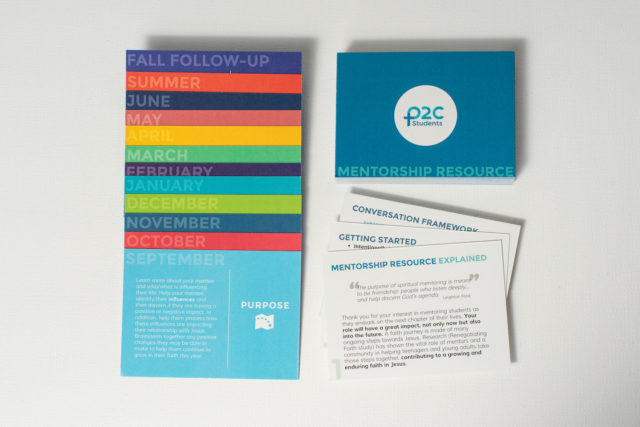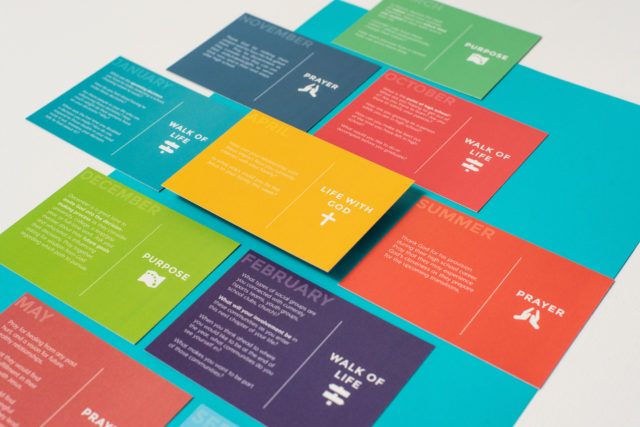Why mentor?
NEXT longs to help grade 12 students make the transition out of high school and into the next stage of their lives.
Graduating and moving on to college or university can be a difficult process, and one that can come with a lot of changes in a young person’s life. The Renegotiating Faith study found that having a mentor and a connection to spiritual community were key in helping students to continue seeking spiritual growth and church involvement.
The Mentorship Resource was created to give mentors a framework of conversations to have with students over the course of their final year of high school and the first 2 months of college or university. We hope that these conversations will help students make thoughtful choices as they prepare for life after high school––choices that will impact both their academic and spiritual journey.
Our grade 12 initiative, NEXT Initiative, created these cards to equip mentors to better guide students in their final year.

Tips on Mentoring
Watch this 5 minute video from Lifeteams sharing tips on mentoring youth.
Download the Mentorship Resource
You can now order physical copies of the Mentorship Resource from the P2C Store. Please only use the form below to get digital copies, thanks!
FAQ
The Mentorship Resource
Q: What is NEXT’s Mentorship Resource?
A: The Mentorship Resource is a series of conversations designed to facilitate a relationship between a Christian mentor and a mentee who is transitioning from high school into a new phase of life.
These conversations are organized as a set of cards which provide a consistent and intentional framework of conversation-starting prompts on topics relevant to young adults.
Q: How does this Mentorship Resource work?
A: It works by bringing people together! The main goal of each suggested conversation is to encourage a mentoring relationship through talking about things that matter.
Each conversation topic includes four parts:
- Purpose: statements identifying the conversation’s topic and goal
- Walk of Life: questions reflecting on the topic
- Life with God: questions exploring Jesus’ relevance
- Prayer: prompts encouraging prayer
Q: What topics are covered?
A: Over twelve conversations, the Mentorship Resource helps to identify the mentee’s:
- Influences
- Community contributions
- Strengths and skills
- Future goals
- Upcoming decisions
- Communities and friendships
- Personal values
- Family dynamics
- Thoughts on romance
- Attitude towards money
- Opportunities to celebrate and reflect
- Adjustment to life after high school
However, feel free to talk about other things as well.
Q: What’s the time commitment?
A: The Mentorship Resource is designed to be used over 14 months, with a total of 12 meetings. We recommend starting in September and meeting monthly until June, and then just meeting once in the summer and following fall. But this suggested timeline can certainly be adapted.
Give yourself an hour or an hour and a half to connect and have a meaningful conversation. Ideally mentors should also take 15-30 minutes before meetings to review the resource and pray for their mentee.
Q: How much does it cost?
A: The digital version is free! A physical copy (a deck of cards) costs $8.99 CAD. But if this cost holds you back, please reach out to us at next@p2c.com. Physical copies can be ordered HERE via the P2C Store.
The physical copy set is advantageous because it reduces the distractions that may come up when viewing the digital cards on a device.

Mentors & Mentees
Q: Who can be a mentor?
A: Anyone! Mentorship is really about caring, listening, and journeying along with students. You don’t need to be an “expert” or at a particular life stage. Students appreciate mentors for their care, not for what they know.
Q: I’m interested in being a mentor; who should I mentor?
A: Do you know any current highschool students, or those who may have recently graduated? Quality and depth of trust is key in mentorship, so starting with someone you know already is ideal. Any young person would benefit from support, so consider taking a step of faith to reach out to someone in your church/community even if you don’t know them well yet.
Q: I’m a student who wants a mentor; how do I find one?
A: Look for a trusted adult who is in a different life stage than you. Ask them to meet you for coffee to help you process your future. You can share the resource and see if they would be available and interested in walking through it with you on a regular basis.
Q: Can students who aren’t going to college or university be mentored?
A: Yes! Regardless of their plans, it’s always good to provide help through the transition out of high school. The conversation topics are broad enough to benefit all young adults. We do recommend reading through all the questions and prompts ahead of time so that if they need to be adjusted, you can be prepared to talk about each person’s unique situation.
Q: Can mentorship start before grade 12?
A: Mentorship in general can happen at any time, but our resource is specifically encouraging mentorship for students in their final year of high school. We believe that this is the most important time for a mentoring relationship, because the transitions are obvious and significant. Plus, we’ve found that students are often more willing to engage with a mentor when there’s a strong anticipation of change—younger students may give the excuse of “There’s still next year.”

Practical Tips for Success
Q: How do mentoring relationships usually begin?
A: Ask a student to meet up, and invite them into a mentor-mentee relationship. Show them the cards (or digital images) that you’ll reference in your conversations. See if this is something that would help them navigate their year. Propose and discuss the timeline, like how often and for how long you would meet (eg. 60 mins per conversation, once or twice a month). After a few weeks, review together. Allow them to decide if they would like to continue on. If so, evaluate and make any adjustments.
Q: What if it ends up being awkward?
A: It might be! And that’s okay. Awkwardness is not a sign that someone is doing something wrong, but new relationships can be uncomfortable. Pushing through awkwardness and the discomfort of a new relationship can be a sign of intentionality. Over time, you should feel more natural connecting with each other.
Q: What’s the difference between in-person and online meetings?
A: While meeting online for conversations is convenient, having face-to-face conversations is very meaningful towards fostering a mentor-mentee relationship. Body language provides a different and valuable way of listening and talking. At minimum, if possible, seek to have your first two or three conversations in person before moving towards online video conversations.
We also understand that meeting online is the safer (and more allowable) method during the COVID-19 pandemic. Please abide by (or adhere to) your local government guidelines with regards to meeting people face-to-face.
Q: Where should in-person mentoring happen?
A: Choose a space that allows for vulnerable conversation, but also gives you both transparency and safety. Coffee shops, local libraries, or public outdoor spaces may be a great place to meet.

Next steps
Q: What happens after completing the Mentorship Resource?
A: You can either continue the mentoring relationship or encourage the student to find another mentor in their new context. This could be helping them get connected to a new local church, a spiritual community on campus, or connecting them with someone else you know.
Q: How can I give feedback on NEXT’s mentoring resources? (Review & Feedback)
A: If you have further questions or are willing to give us some feedback, we would really appreciate it. Send us a note at next@p2c.com.
Learn more about NEXT, Grade 12 initiative of P2C-Students.
Mentorship in French
Le guide de mentorat est une série de conversations conçues pour faciliter la relation entre un.e mentor chrétien.ne. et une personne accompagnée qui passe du secondaire à une nouvelle phase de sa vie. Ces conversations sont organisées pour fournir des suggestions de points de départ pour des conversations intentionnelles sur des sujets pertinents pour les jeunes adultes.

